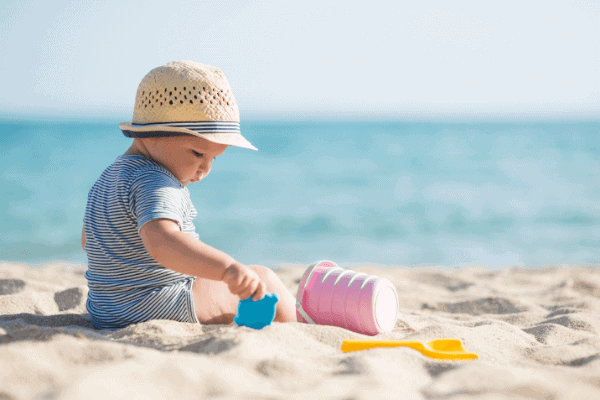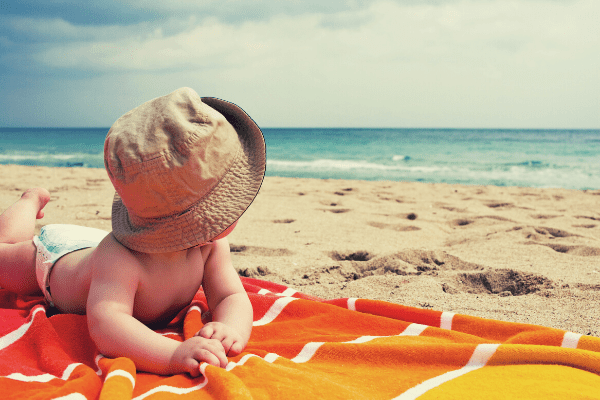When Can Babies Go to the Beach? Parents Need to Know
Taking your baby to the beach for the first time is exciting, but if you’re like me, you worry about everything, so you might wonder – when can babies go to the beach?
I wanted to take my infant to the beach, but I was concerned about my baby’s safety. Was it a good idea? Could something happen to my baby?
Parents have to make the best decision possible based on the information they have available. We know that infants under six months old need to stay out of the sun as much as possible, so taking an infant to a beach might be tricky.
Don’t stress; here is what you need to know about when can babies go to the beach safely.
Is It Safe to Take a Newborn Baby to the Beach?
If you live close to the beach, you might wonder if it’s safe to take a newborn baby to the beach. I know if I lived near a beach, I would want to spend my postpartum days lounging in the sand and relaxing, but is it safe?
The answer is yes, you can take a newborn to the beach if you follow some important safety tips for your baby. Understand that babies under six months old need to be shelter from sun exposure, and babies cannot regulate their temperature. That puts them at a serious risk of heat stress and exhaustion.
It’s your job to protect your newborn.
Here are some tips for taking a newborn to the beach.
- Make sure you have a sheltered location under an umbrella or shelter for your infant. Keep it away from the water’s edge.
- Have a clean place for your newborn to lay.
- Keep your baby as cool as possible with cool towels, misting, and plenty of hydration.
When Can Babies Go to the Beach?

Ideally, the best time to take your baby to the beach is when they’re six months old and up, but you can take your baby whenever you want if your baby stays out of the water and sun.
The American Academy of Pediatrics says that babies need to stay out of the sun until they’re six months old, and most sunscreens aren’t safe to use until your baby is at that age. Their skin is delicate and the likelihood of sunburn is high for a young infant.
Also, open water environments, like the beach, aren’t ideal for infants younger than two months old because they have weak immune systems. Most people don’t think about it, but rivers, lakes, and oceans are breeding grounds of bacteria. These bacteria are fine for our immune system, but it might not be for an infant.
Make sure you take a look for any local water advisories. If you feel concerned, talk to your pediatrician!
The Best Times to Take Your Baby to the Beach
When you go to the beach, your baby’s skin is at risk for sunburn. Keeping your baby in the shade as much as possible is crucial, but it’s not always possible, especially if you need to keep an eye on older kids.
The best times to take your baby to the beach is before 11 am and after 3 pm. In between those times, the sun is the hottest and the strongest, increasing the risk of burns and heat stress.
How to Take Your Baby to the Beach Safely
Experiencing the beach with your baby for the first time is exciting, but you want to do so safely. Here are some of the most important considerations.
1. Provide Plenty of Shade
Without a doubt, when you’re taking your baby to the beach, you have to ensure there is plenty of shade. Babies need to be out of the sun as much as possible, so bring an umbrella or canopy with you. Another option is a baby tent, but those can get toasty if they sit in the sun.
2. Wear UV Clothing
Babies need to be dressed in appropriate clothing when at the beach. Cotton clothes are great because they’re breathable, dry fast, yet block the sun from burning your baby.
Another option is to wear UV clothes or swimsuit. Make sure your infant has a wide-brimmed sunhat that will protect their face, neck, and sun. If possible, consider sunglasses, but not all infants will keep sunglasses on their face.
3. Use Sunscreen When Appropriate
The AAP says that babies can wear sunscreen if they’re six months and older. It’s best to apply sunscreen 30 minutes before heading out into the sun and reapply every one to two hours.
Use a baby-friendly sunscreen; look for something that is zinc oxide based and at least a SPF 50 or higher.
4. Keep Your Baby Hydrated and Cool
Babies have an increased risk of heat stress, exhaustion, and stroke because they’re unable to regulate their temperature like adults. Bringing your baby to the beach is undoubtedly fun, but it’s imperative to keep your baby hydrated and cool.
If you breastfeed, increase how often you feed your baby because babies need more hydration. If you formula feed, you can offer small sips of water if your pediatrician tells you that it’s safe.
Use cool rags and spray bottles to keep your baby safe. If your baby is over six months old, bring baby food in a cooler to help keep your baby at the perfect temperature.
Final Thoughts
The answer to when can babies go to the beach is whenever the parents want to take their baby, but the best time is when your infant is six months or older. Keep your young infants out of open water and out of the sunlight to reduce risks of sunburns and bacteria-caused diseases.
If you go to the beach before this age, make sure you follow all of the important safety tips to keep your baby happy at the beach.







Pingback: The 11 Best Family Resorts in North Carolina - Following the Jordans